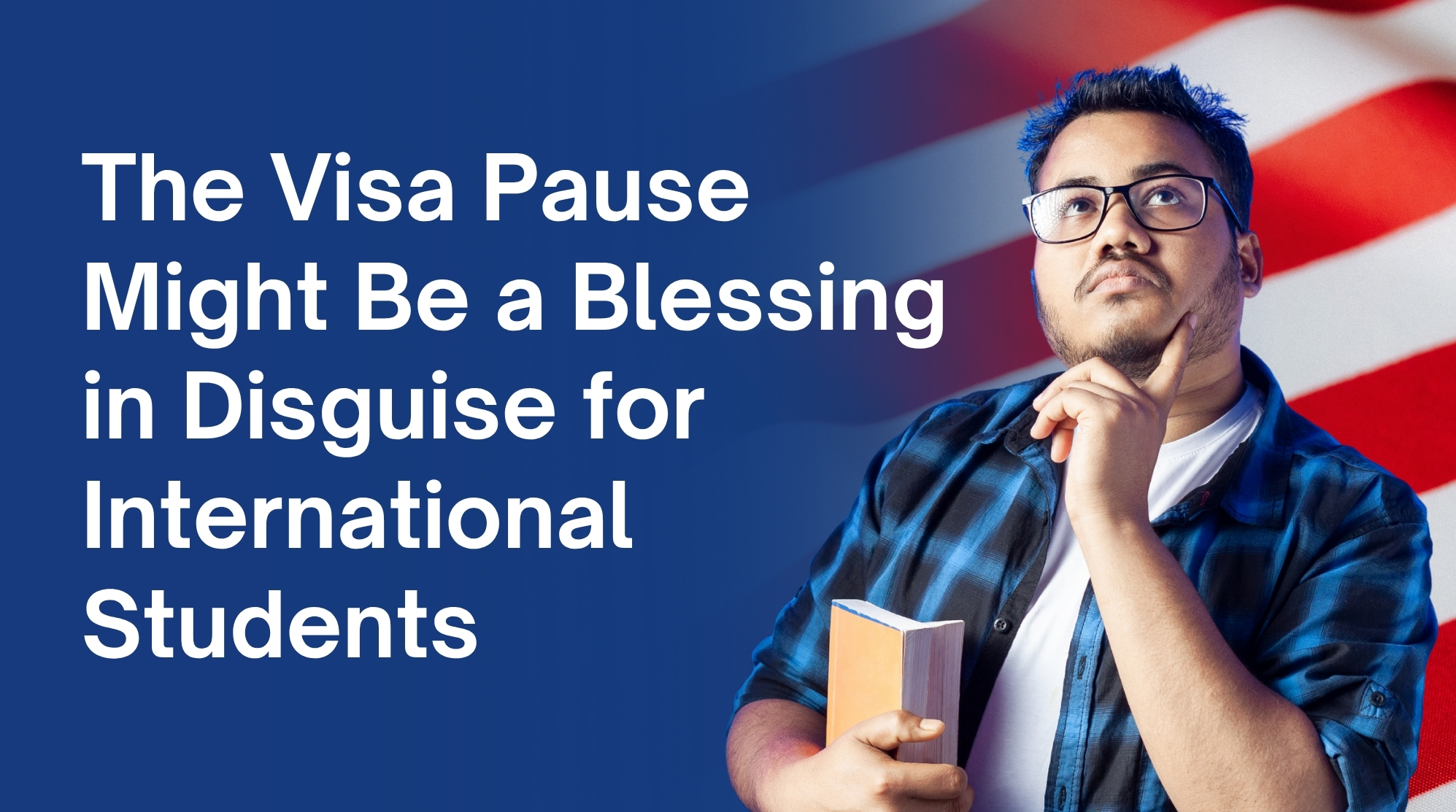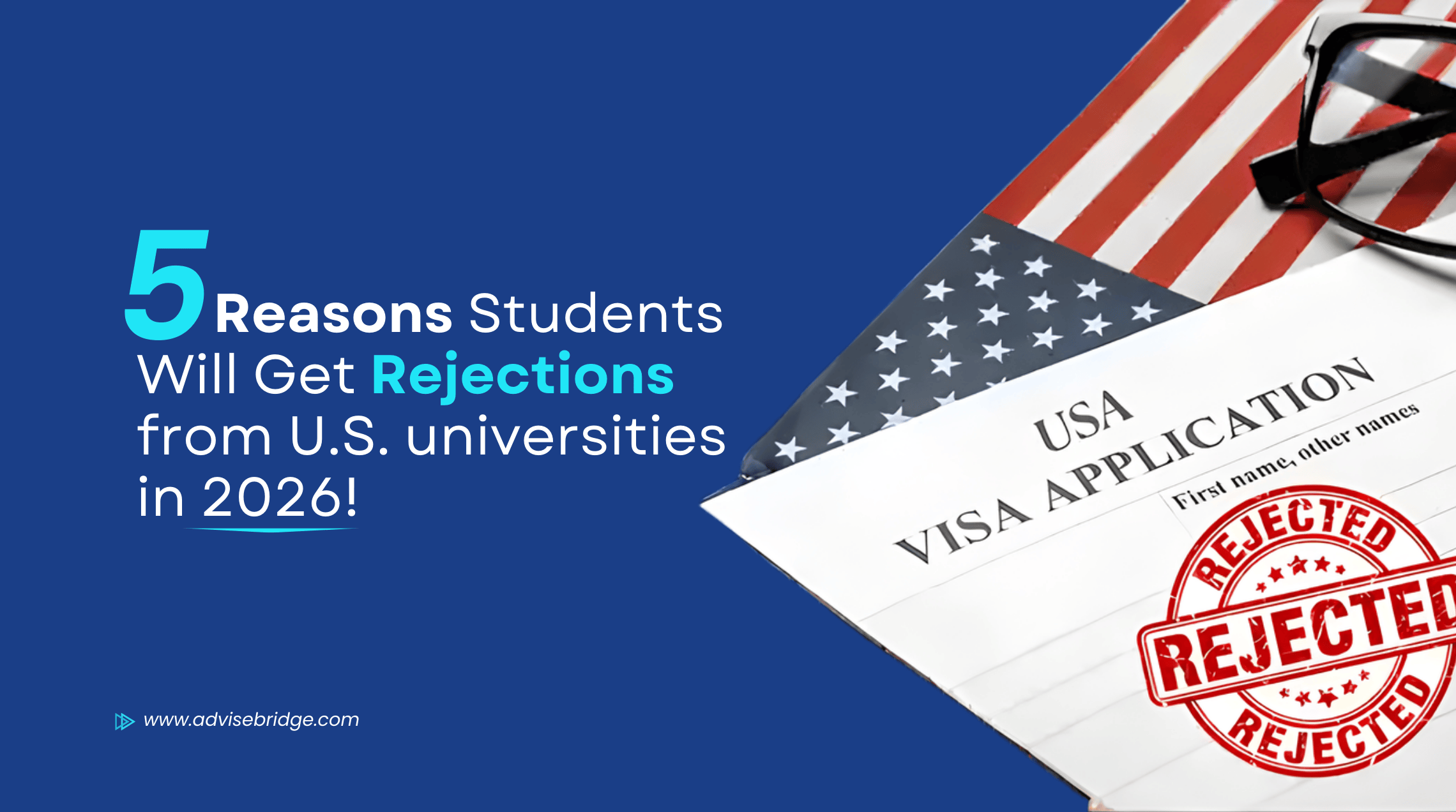On May 27, 2025, the sudden announcement of a pause in U.S. student visa interviews hit international students hard. For those who had already completed their applications, received offer letters, or told their families they’d be leaving for the Fall semester, the news felt like an unexpected earthquake shaking the foundation of their plans. Social media filled with frustration, worry, and confusion.
But beneath this disruption lies an opportunity. At AdviseBridge, after years of guiding students through complex global challenges—from COVID-era embassy closures to shifting political landscapes—we’ve learned one thing: delays often force us to slow down and prepare better. And that better preparation usually leads to better outcomes.
Instead of thinking of this visa pause as a full stop, what if we treat it as a strategic pause—a chance to sharpen your profile, strengthen your future, and gain clarity on your goals?
Better Applications Begin With Time
Every admissions season, countless students submit rushed applications. SOPs are written in a hurry, often lacking the depth that can turn a good essay into a powerful story. Recommendation letters are requested at the last minute, resumes are half-finished, and tiny mistakes in online applications go unnoticed until it’s too late.
Now that you’re not racing against an immediate visa deadline, you can actually breathe—and refine. You can revisit your Statement of Purpose and rework it to tell a more compelling, heartfelt narrative about your goals and aspirations.
You can work closely with your recommenders, give them detailed context about your achievements, and ensure they have time to write letters that truly reflect your potential. Even your application essays can evolve from being generic to deeply personal, showing why you’re a perfect fit for a particular program or university. This time is your chance to elevate your profile into something extraordinary—not just good enough.
Related Blog: How To Write A Powerful Statement of Purpose (SOP) for U.S. University?
The Gift of Financial Breathing Room
Finances are one of the biggest stressors for international students and their families. Tuition, travel, visa fees, housing—it all adds up quickly. The visa pause, while inconvenient in the short term, also means you have more months to plan and prepare financially.
Families can use this time to save more systematically, explore better education loan options, or even apply for scholarships that have later deadlines. In fact, many scholarships go unnoticed because students are too busy focusing on application logistics. Now you have the time to research, apply, and maybe even secure merit-based grants or assistantships that make studying abroad far more affordable.
Instead of rushing into financial decisions under pressure, you have the opportunity to make thoughtful, strategic choices that can protect your family’s long-term financial stability.
Sharpen Your Test Scores Without Panic
English proficiency and entrance exams like TOEFL, IELTS, GRE, or SAT are essential for many U.S. university applications. In normal circumstances, students often take these tests in a rush, sometimes with little preparation, simply to meet application deadlines. The results are often underwhelming—not because of a lack of ability, but because of stress and limited time.
Now, with the visa process on hold, you can approach these tests with patience. You can study smarter, take mock exams, and even attempt the tests multiple times to achieve your best possible scores. And those higher scores can open doors to better universities and more competitive scholarships. What once seemed like a burden can now become a competitive advantage—if you invest the time wisely.
Rethink Your University Choices—Strategically
One of the lesser-discussed realities of the student application process is how often decisions are made based on surface-level knowledge. Students apply to universities they’ve heard of from friends, seen on a list, or recognized from rankings—often without truly researching whether the institution fits their personal and professional goals.
This unexpected pause gives you the chance to dig deeper. You can now study course curriculums in detail, look into faculty profiles, research job placement statistics, and compare universities not just on name, but on what they offer to someone with your specific background and goals.
You can contact admissions officers, join student forums, attend virtual open houses, and actually get to know the place you’ll spend years of your life. In doing so, you might discover that there are better matches out there—universities that align more closely with your ambitions, offer stronger job support, or simply feel like the right community for you.
Time to Add Valuable Skills
What if this delay allowed you to add something truly meaningful to your resume? Instead of sitting idle, you can use this time to upskill. Whether it’s a Google certification in Data Analytics, a short course on Artificial Intelligence through Coursera, or even learning a new coding language, everything you learn now increases your value in the eyes of both universities and future employers.
Beyond academics, consider doing a remote internship, working on a personal project, or volunteering in your local community. These experiences don’t just build your skillset—they demonstrate resilience, initiative, and maturity.
When an admissions officer or employer sees that you used a time of global uncertainty to improve yourself, it leaves an impression that goes beyond grades or test scores.
Strengthen Your Network and Relationships
With things temporarily on hold, now is the perfect time to build relationships that can support you long after the visa pause ends. Reach out to professors, connect with alumni from your target schools, and find online communities of students who are in the same situation as you.
Many students underestimate the power of relationships. A single email conversation with a professor can clarify what a department is really looking for. Talking to current international students can help you avoid common pitfalls and get insider tips on scholarships or housing.
Building a network now means you won’t feel alone when it’s finally time to make the move—and those connections can be a source of opportunity and comfort for years to come.
A Moment for Deep Personal Reflection
In all the rush to meet deadlines, pass tests, and book interview slots, very few students get a chance to pause and ask themselves: Why am I doing this?
Is the U.S. really the best place for your goals? Are you truly excited about your chosen field of study—or are you just following a trend? Are you emotionally ready for the life transition that studying abroad brings?
This moment of pause can serve as a mirror, reflecting questions that get lost in the hustle. It’s your chance to reexamine your path and ensure that the road you're on is genuinely the right one for you. And if it isn’t? That’s a discovery worth making now, not later.
What The Previous Bans/Pause Were?
It might feel like the world has stopped. But it hasn’t. And it won’t.
History reminds us that every global crisis eventually fades. During the COVID-19 pandemic, student visas were suspended for months. Embassies were closed, and admissions cycles were thrown into chaos. But students bounced back, and visa approvals eventually reached record levels.
Even after 9/11, when the U.S. tightened visa processes, the change was not permanent. Policies evolve, leaders change, and international education always finds a way forward—because global talent is not something any country wants to lose. This pause is not permanent. What you do during it will define your future, not the pause itself.
Building Emotional Resilience
Let’s not ignore how you feel. The mix of hope, fear, frustration, and uncertainty is completely real. But if you’re reading this, you’re not someone who gives up easily. You’re looking for solutions. You’re thinking forward. That matters.
This season of uncertainty is quietly building one of the most important skills for your future: emotional resilience. Life abroad, higher studies, and professional challenges will all test you. Learning how to stay grounded, resourceful, and proactive during setbacks will be your greatest advantage—not just now, but for the rest of your life.
Final Thoughts: This Is Your Time to Build
This visa pause is not the ending of your journey. It’s a recalibration—a chance to build a better version of your dream. You have time to create a stronger profile, secure better financial support, make smarter decisions, and enter the next phase of your life fully prepared.
At AdviseBridge, we’ve walked with thousands of students through unexpected delays and seen them emerge stronger, more confident, and more successful than ever before. You are not alone. And this is not the end.
This is your moment to pause, plan, and rise.







